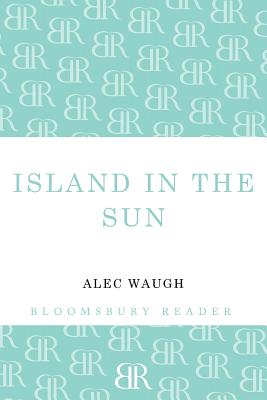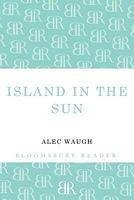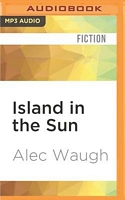- Welcome to FictionDB, Guest
- | My Account
- | Help

Island in the Sun — Alec Waugh

To the casual visitor Santa Marta is a sub-tropical paradise, a small sister of Jamaica, Bermuda and Nassau, unmentioned in the colour-splashed brochures of travel agents: an island where the sun shines throughout the year on the sandy beaches of innumerable coves, on the cane-fields and coconut plantations, on the shingled hits of the peasant villages and the fine houses of the white planters handed down through generation after generation, from the Sugar Barons of a past century. But this was not how the newspaper columnist, Bradshaw, saw it when he arrived on his first trip to the Caribbean. Bradshaw found Santa Marta a smouldering volcano.
This novel is a brilliantly successful evocation of the atmosphere and the problems of life on a West Indian island. It is a dramatic story, packed with incident and thrilling in this mounting tension. It weaves into the fortunes of a small group of islanders the ambitions and jealousies, the hopes and fears, the complexes and inhibitions of a people to whom the tint of the skin is more important than wealth, or power, or skill, whose tangled history has bequeathed a heritage of passion in an island where the blood never cools.
Original 1955 Blurb:
This novel is a brilliant and distinguished book; a story with tension and excitement. It is a vivid tale of violence and suspense against the background of a sun-drenched island in the West Indies.
A few casual words spoken at a cocktail party in Santa Marta, an attractive girl arriving at a reception in London, a stalled engine that starts a minute too soon -- these lead directly to the ouster of a cabinet minister, the recall of a governor, the downfall of a demagogue and a new career for a slipping gossip columnist.
A single, exciting thread of dramatic narrative holds together the ambitious, jealousies, complexes, hopes, fears, ideals and inhibitions of the colonial administrators, the feudal land owners, the educated colored lawyers; the slightly colored planters with chips on their shoulders, the ambitious but parochial politicians, the daughters of white planters who can find no suitable mates of their own class and color, the ignorant, good-natured, easily inflamed proletariat -- all the varied types who make their separate contribution to the turmoil under that hot sun of contemporary West Indian life.
Mr. Waugh has succeeded in giving us not only a story of passion and murder, of jealousies and rivalries in the tropics, but also a shrewd analysis of self-government and the determination of people's. Four and a half centuries ago the impossible situation was created in the West Indies of a small white aristocracy ruling a large colored working class that had been shipped in slavers from the Guinea coast; for three centuries the Caribbean was the focal point of European policy, with the phrase 'rich as a Creole' in daily use, then after emancipation and the slump in sugar, it became a distressed area. Now it is the center of a tourist boom. Every resident in the islands, white, black, and partly black, is what he is today because of that tangled history.
This novel is a brilliantly successful evocation of the atmosphere and the problems of life on a West Indian island. It is a dramatic story, packed with incident and thrilling in this mounting tension. It weaves into the fortunes of a small group of islanders the ambitions and jealousies, the hopes and fears, the complexes and inhibitions of a people to whom the tint of the skin is more important than wealth, or power, or skill, whose tangled history has bequeathed a heritage of passion in an island where the blood never cools.
Original 1955 Blurb:
This novel is a brilliant and distinguished book; a story with tension and excitement. It is a vivid tale of violence and suspense against the background of a sun-drenched island in the West Indies.
A few casual words spoken at a cocktail party in Santa Marta, an attractive girl arriving at a reception in London, a stalled engine that starts a minute too soon -- these lead directly to the ouster of a cabinet minister, the recall of a governor, the downfall of a demagogue and a new career for a slipping gossip columnist.
A single, exciting thread of dramatic narrative holds together the ambitious, jealousies, complexes, hopes, fears, ideals and inhibitions of the colonial administrators, the feudal land owners, the educated colored lawyers; the slightly colored planters with chips on their shoulders, the ambitious but parochial politicians, the daughters of white planters who can find no suitable mates of their own class and color, the ignorant, good-natured, easily inflamed proletariat -- all the varied types who make their separate contribution to the turmoil under that hot sun of contemporary West Indian life.
Mr. Waugh has succeeded in giving us not only a story of passion and murder, of jealousies and rivalries in the tropics, but also a shrewd analysis of self-government and the determination of people's. Four and a half centuries ago the impossible situation was created in the West Indies of a small white aristocracy ruling a large colored working class that had been shipped in slavers from the Guinea coast; for three centuries the Caribbean was the focal point of European policy, with the phrase 'rich as a Creole' in daily use, then after emancipation and the slump in sugar, it became a distressed area. Now it is the center of a tourist boom. Every resident in the islands, white, black, and partly black, is what he is today because of that tangled history.
Genres
Sub-Genres
Click on any of the links above to see more books like this one.



